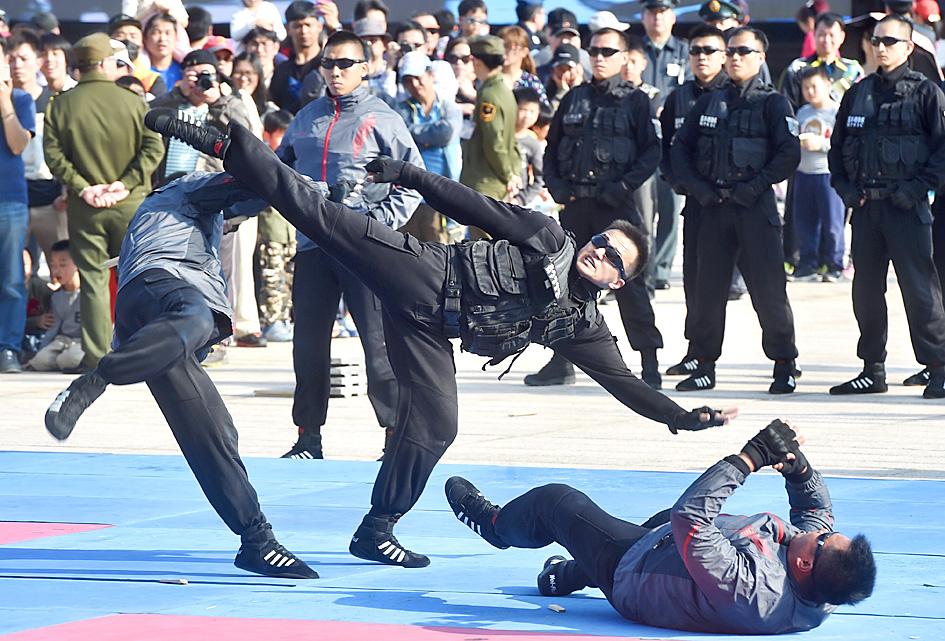Taiwan is stepping up military cooperation with long-standing partners and forging new ties as it bolsters training exercises with the US Army Special Forces and trains officers and soldiers from an undisclosed Middle Eastern country, a high-ranking military official said yesterday.
The Republic of China Military Police Special Services Company, commonly called the Night Hawks, has standing collaborations with the US Army Special Forces, commonly known as the Green Berets, for regular joint exercises, said the official, who spoke on condition of anonymity.
Taiwan and the US have increased the frequency of training and adapted course materials to meet the needs of the security situation in East Asia, the official added.

Photo: Chien Jung-fong, Taipei Times
One of the joint exercises added to the program last year involved observing Green Berets training in a simulated battle zone in Washington state, they said.
Through the training, the Night Hawk unit aimed to sharpen its knowledge of wartime military operations and boost the special operations capabilities of the Military Police Command.
The Night Hawks’ standing invitation to participate in the annual Pacific Area Special Operations Conference would expand its network, and help it look beyond Taiwan and regional concerns, the official added.
The source also said that Taiwan has reached an agreement with a Middle Eastern country to provide counterterrorism training to that nation’s officers and soldiers in Taiwan, without disclosing the country’s name.
The first group of trainees has completed their training and returned to their home country, but the second group’s arrival has been delayed due to the COVID-19 pandemic, the source said.
The deal is a breakthrough for the command, they said, adding that high-ranking officers from both sides visited each nation last year.
The Ministry of National Defense is to schedule a visit to the Middle Eastern country and send a platoon of Night Hawks for training exercises once the pandemic eases, the source said.
Visits by high-ranking officers to Taiwan and the Middle Eastern country would likely be normalized in the future, the source added.
Taiwan’s special forces are respected internationally and are one of the few units in Asia that can train themselves and provide counterterrorism training to other nations, the source said.
Separately on Friday, the ministry said that a Chinese Y-8 military transport aircraft entered Taiwan’s air defense identification zone while flying over waters southwest of the nation.
The intrusion occurred at about noon, the ministry said, adding that the aircraft left the area after being warned over radio by Taiwanese fighter jets.
It was the seventh time this year that Chinese military aircraft have been spotted flying near Taiwan.
Air activity over the waters surrounding Taiwan are being closely monitored by the military, the ministry said.
“At present, there is no cause for alarm,” it added.
Additional reporting by CNA

CHAOS: Iranians took to the streets playing celebratory music after reports of Khamenei’s death on Saturday, while mourners also gathered in Tehran yesterday Iranian Supreme Leader Ayatollah Ali Khamenei was killed in a major attack on Iran launched by Israel and the US, throwing the future of the Islamic republic into doubt and raising the risk of regional instability. Iranian state television and the state-run IRNA news agency announced the 86-year-old’s death early yesterday. US President Donald Trump said it gave Iranians their “greatest chance” to “take back” their country. The announcements came after a joint US and Israeli aerial bombardment that targeted Iranian military and governmental sites. Trump said the “heavy and pinpoint bombing” would continue through the week or as long

TRUST: The KMT said it respected the US’ timing and considerations, and hoped it would continue to honor its commitments to helping Taiwan bolster its defenses and deterrence US President Donald Trump is delaying a multibillion-dollar arms sale to Taiwan to ensure his visit to Beijing is successful, a New York Times report said. The weapons sales package has stalled in the US Department of State, the report said, citing US officials it did not identify. The White House has told agencies not to push forward ahead of Trump’s meeting with Chinese President Xi Jinping (習近平), it said. The two last month held a phone call to discuss trade and geopolitical flashpoints ahead of the summit. Xi raised the Taiwan issue and urged the US to handle arms sales to

State-run CPC Corp, Taiwan (CPC, 台灣中油) yesterday said that it had confirmed on Saturday night with its liquefied natural gas (LNG) and crude oil suppliers that shipments are proceeding as scheduled and that domestic supplies remain unaffected. The CPC yesterday announced the gasoline and diesel prices will rise by NT$0.2 and NT$0.4 per liter, respectively, starting Monday, citing Middle East tensions and blizzards in the eastern United States. CPC also iterated it has been reducing the proportion of crude oil imports from the Middle East and diversifying its supply sources in the past few years in response to geopolitical risks, expanding

Pro-democracy media tycoon Jimmy Lai’s (黎智英) fraud conviction and prison sentence were yesterday overturned by a Hong Kong court, in a surprise legal decision that comes soon after Lai was jailed for 20 years on a separate national security charge. Judges Jeremy Poon (潘兆初), Anthea Pang (彭寶琴) and Derek Pang (彭偉昌) said in the judgement that they allowed the appeal from Lai, and another defendant in the case, to proceed, as a lower court judge had “erred.” “The Court of Appeal gave them leave to appeal against their conviction, allowed their appeals, quashed the convictions and set aside the sentences,” the judges